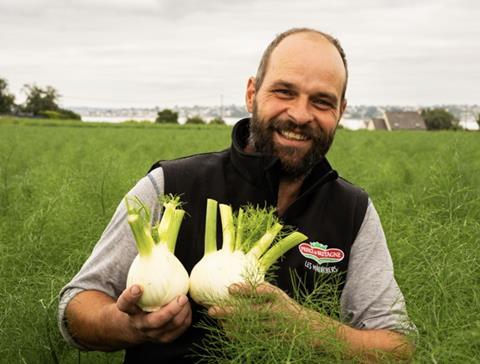Prince de Bretagne’s product manager Pierre Gelebart explains how the collective brand allows small-scale market gardening to continue to thrive
Tell us about the structure and philosophy of Prince de Bretagne.

Prince de Bretagne is a collective brand for Brittany’s market gardeners. It is owned by Cerafel, an association that brings together several Breton vegetable cooperatives. Therefore, the Prince de Bretagne brand belongs to its producers.
This organisation allows us to market a whole range of vegetables year-round under the same brand, following the same specifications, and therefore the same quality.
Cauliflower, tomatoes, shallots, early potatoes, artichokes, and broccoli remain the main crops, but 145 different vegetables are produced, including organic produce, baby vegetables, and others.
The Prince de Bretagne organisation allows us to consolidate our offerings, thus facilitating logistics, but we do not directly market our produce. We carry out the initial marketing, and our buyers (80 private companies) are authorised traders who buy and resell Prince de Bretagne vegetables every day on all channels and to all countries, particularly European ones.
Market gardening is much less widespread in the UK than it used to be. Why do you think it is still thriving in Brittany?
As everywhere, the number of vegetable growers at Prince de Bretagne is decreasing. At the same time, farms are expanding. Vegetable growing remains important on the north coast of Brittany thanks to the climate, the soil, and the people. The wide variety of vegetables produced allows for crop rotation in the fields.
Technical progress has made the work a little easier, although it remains very manual. Around 90 per cent of our vegetables are harvested by hand. It is this manual labour and the courage of the growers that keeps vegetable growing so important on the north coast of Brittany.
The other important point is that all Prince de Bretagne growers are business owners who are masters in their own homes and decide what to produce. But whether at the cooperative, Prince de Bretagne, or product section level, many people participate in the meetings that make decisions at a regional level.
In the end, at Prince de Bretagne it’s always the producer who decides. Alone we go faster, together we go further. This is a perfectly applicable concept to our organisation.
Does having so many small-scale growers in the cooperative make it harder to coordinate supply and find buyers for the produce?
No, this is not the case thanks to our marketing method. Our three main cooperatives adapt to market developments to facilitate both business and the producers’ lives. Everything is done to ensure the producers’ income is as high as possible.
With 1,400 producers spread over 200km, the consolidation of grading and packaging stations has been prioritised in recent years to ensure all our vegetable producers, regardless of their geographic location and production volume, can access the market.
How do you coordinate R&D within the Prince de Bretagne cooperative, and what areas is it currently focusing on?
We have “innovation units” within each cooperative that, along with the Prince de Bretagne marketing department, brainstorm, propose, and study new production opportunities. We also have two technical stations that conduct trials, both in open fields and under cover, for both organic and conventional production.
In addition, there is the OBS (Breton Selection Organisation), which develops varieties adapted to Breton climatic and geographical conditions. A sensory analysis laboratory allows us to validate the taste of new varieties before they are marketed.
I understand that Prince de Bretagne is aiming for 20 per cent of its production to be organic by 2030. Are you on track to achieve this, and what have been the biggest challenges you’ve faced so far?
That’s the goal. The organic market seems to be regaining strength after a difficult economic period, particularly due to consumer purchasing power issues.
Our production has remained stable in recent years, as has the number of producers, which is quite positive compared to the organic market as a whole. Our organisation, which offers both organic and conventional products, is one of the reasons for this. Products that didn’t find buyers in the organic sector could be redirected, as a last resort, to conventional products, thereby limiting unsold items at the production level.
The other strength of our organic production is that we can guarantee substantial volumes of organic products to the industry, particularly frozen food factories, thus meeting their demand.
How does Prince de Bretagne contribute to sustainable development in Brittany, both from an environmental and social perspective?
Agriculture is at the heart of the social and environmental challenges of the 21st century: feeding all people, developing territories, combating climate change, reducing poverty, and creating sustainable jobs. With this in mind, Prince de Bretagne continues its commitment and its actions. Our four priorities are:
1. Sustaining the market gardening profession
- Ensuring fair and equitable remuneration for market gardeners
- Making farming and our agriculture more attractive
- Defending our cooperative model
2. Guaranteeing healthy, fresh, and high-quality fruits and vegetables
- Guaranteeing the organoleptic qualities of our products
- Ensuring the freshness and quality of our products
3. Offering an environmentally friendly agricultural production model
- Reducing the use of inputs
- Preserving biodiversity and soil quality
- Developing agricultural practices to combat and adapt to climate change
- Sustaining our vegetable sector by limiting dependencies
4. Being a key player in the development and sustainability of the Breton region
- Making Brittany a more appealing region
- Optimising logistics



